Main photo: Albert Kok (CC BY-SA 3.0)
As we move into the new world of covid travel, more countries are welcoming tourists back to their idyllic shores. There are numerous destinations worldwide that no longer need you to quarantine upon arrival. And you know what else? Now is the perfect time to pack your bags and visit them. You can take your time exploring top tourist attractions and the world’s best dive sites without any crowds. Added to that, dive sites are busy with marine life that has flourished in the absence of humanity. Let’s take a look at nine great dive destinations welcoming tourists now.
Australia
Why visit Australia now?
As Australia heads into autumn and winter, the next few months are one of the best times to visit the Great Barrier Reef. The weather is generally dry, sunny and warm and the diving conditions are great.
This enormous reef system has long been known for its diverse coral reef diving, suitable for all experience levels, and it also has a range of seasonal highlights. Winter is whale season at the Great Barrier Reef, and you can go swimming with dwarf minke whales and spot migrating humpback whales.
If you love mantas, visit the southern parts of the Great Barrier Reef (just north of Brisbane) from June to September. More than 100 mantas congregate around Lady Elliot and Lady Musgrave Islands at this time of year.
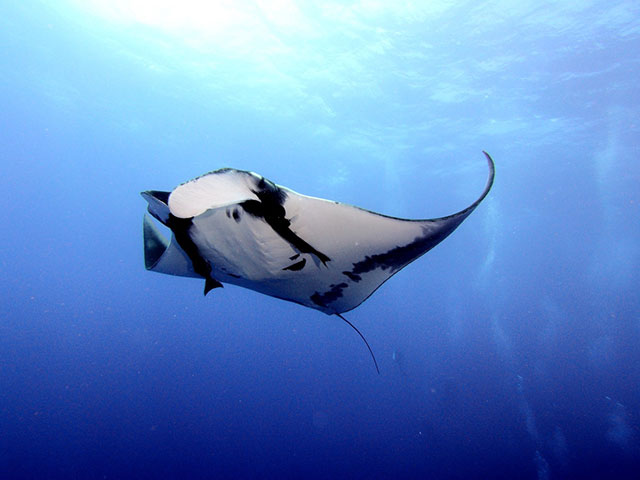
Meanwhile, Ningaloo Reef in Western Australia is in the middle of its whale shark season and will soon be busy with manta rays, plus humpback whales from late May onwards. If you’ve always dreamed of swimming with ocean giants, it is a great place to visit and has few diving crowds.
Australia’s covid-related entry requirements:
- Proof of vaccination.
- Negative pre-departure covid test (PCR 3 days /RAT 24 hours before departure).
- Visit the Australian government website for more information.
The Philippines
Why visit the Philippines now?
Whilst the main dive season in the Philippines runs from December to April, this country is so vast that some areas offer excellent diving outside of the main season. The Tubbataha Reef Natural Park is one of them and the dive season there is underway from now until June.
Not only is this reef system a UNESCO World Heritage Site, but it is also one of the New Seven Wonders of the World and offers incredible Coral Triangle diving. The reef is a unique example of an atoll reef with an exceptional density of marine life. It hosts around 600 fish species, more than 300 species of corals, 11 shark species, 13 whale and dolphin species and around 100 species of birds.
And if that’s not enough to whet your appetite for diving, you can also encounter whale sharks and mantas at Donsol from now until the end of May.

The Philippines’ covid-related entry requirements:
- Proof of vaccination.
- Negative pre-departure covid test (PCR 48 hours before departure).
- Register with One Health Pass
- Proof of covid travel insurance with at least US $35,000 cover.
- Visit the Embassy of the Philippines website or CDC for more information.
Portugal
Why visit Portugal now?
As the northern hemisphere heads into late spring and summer, Europe’s top dive spots come into a league of their own, offering accessible diving on the doorstep of Europe’s vibrant cities.
Portugal has become increasingly popular in recent years and picked up 20 awards in the 2021 World Travel Awards. As well as an array of topside highlights, there is diving all around Portugal’s coastline and offshore. Most notably at beautiful Madeira and the Azores.
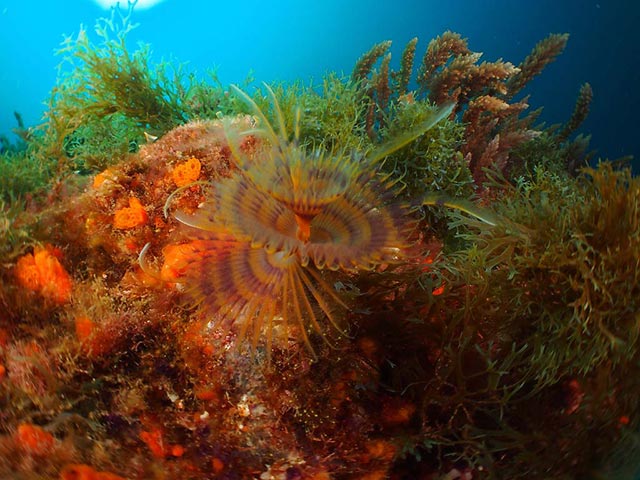
From now until October, it is peak diving season in Portugal and the warm, blue waters are busy with dolphins and whales – including beaked, fin, humpback and sperm whales. Added to that, Portugal hosts loggerhead and leatherback turtles.
Portugal’s covid-related entry requirements:
- Proof of vaccination.
- Negative pre-departure covid test (PCR 3 days /RAT 24 hours before departure) required for some travelers.
- Complete a Passenger Locator Form.
- See the Visit Portugal website for more information.
Fiji
Why visit Fiji now?
You might be drawn to Fiji in summer for warm-water diving and long summer days, but the winter season is a fantastic time to visit. As the water cools and plankton blooms fade away, the ocean turns a deep blue colour and the visibility is spectacular, reaching up to 50 meters (164 feet).
There is an abundance of big fish action from June onwards, with large schools of mackerel and other pelagics at the dive sites, and yet still plenty of fish on the reefs. It is also humpback whale season.
With everything from shallow reefs and gentle lagoons to ripping current dives, it is a paradise for all divers. Fiji also hosts one of the world’s best bull shark dives and is famous for its rainbow-colored soft coral walls.

Fiji’s covid-related entry requirements:
- Proof of vaccination.
- Negative pre-departure covid test (PCR 48 hours /RAT 24 hours before flight).
- Travel insurance.
- Pre-booked RAT test (for within 48-72 hours of arrival).
- Visit the Fiji Travel website for more information.
Greece
Why visit Greece now?
With over 6000 islands and more than 8000 miles of coastline, Greece has plenty of opportunities for keen divers. There you can explore wrecks and thriving reefs, walls, caves and more – all busy with diverse Mediterranean life large and small.
If you like a mixture of reef diving and wrecks steeped in history, Greece is a great choice. There are ancient wrecks full of artefacts, 19th Century Ottoman shipwrecks and World War II wrecks in gin-clear waters. There are also Mediterranean reefs throughout Greece, with diverse landscapes ranging from dramatic sea walls and volcanic formations to caves that host families of seals.
There are hundreds of fish species in Greece, plus eagle rays, stingrays, electric rays and critters. But for the best marine life, visit in summer, when sharks, sea turtles and three species of dolphin can also be found there.

With so many diving options and minimal currents, Greece is a great place to get your diving license and take your kids scuba diving. There are numerous dive centres to choose from, plenty of shore dives and endless choices for island-hopping adventures.
Greece’s covid-related entry requirements:
- Proof of vaccination.
- Negative pre-departure covid test (PCR 3 days /RAT 24 hours before departure) required for some travelers.
- Check the Protocols for Arrivals in Greece for more information.
Egypt
Why visit Egypt now?
Egypt is a classic destination for European divers, offering clear blue waters, plenty of sunshine, and dazzling coral reefs. It is also one of the most affordable diving meccas and a great place to max out on diving without breaking the bank.
As the water warms to a toasty 30°C (86 °F) in summer, now onwards is the best time to visit for warm-water diving and seasonal highlights such as mantas, nesting sea turtles and hammerhead sharks.
That said, diving in Egypt is always like being in an aquarium. There are vibrant reef fish everywhere, blue-spotted stingrays, and hundreds of soft corals swaying in the currents. And you don’t need to go far offshore to enjoy it all. Simply take your pick from Egypt’s extensive range of shore dives, bay-boat trips and liveaboards.
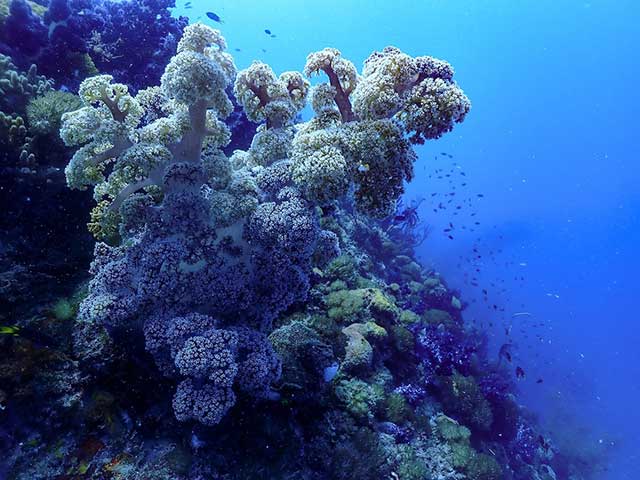
To experience the easy reef and wreck diving Egypt is famous for, go diving in Egypt’s Northern Red Sea. Get your fix of reef diving at well-known Ras Mohammed and the Straits of Tiran, then take a trip to one of the world’s most impressive wrecks – the SS Thistlegorm.
If you’re more experienced, the Southern Red Sea is very rewarding and has incredibly rich reefs with dramatic landscapes and fast-paced pelagic action.
Egypt’s covid-related entry requirements:
- Proof of vaccination.
- Negative pre-departure covid test (PCR or RAT 72 hours before departure) required for some travelers.
- Some travelers tested for covid on arrival.
- Visit the Egypt Travel Advisory for more information.
The Bahamas
Why visit the Bahamas now?
If you go diving in the Bahamas right now, you can catch the end of the peak hammerhead and tiger shark diving season at Tiger Beach and Bimini Island. As well as tigers and hammerheads, you are also likely to encounter Caribbean reef sharks, nurse sharks, and lemon sharks at these premier shark diving destinations.
If that doesn’t meet your shark diving needs, you can also go in search of bull sharks at San Salvador or go diving with oceanic whitetip sharks at Cat Island from now until mid-June.
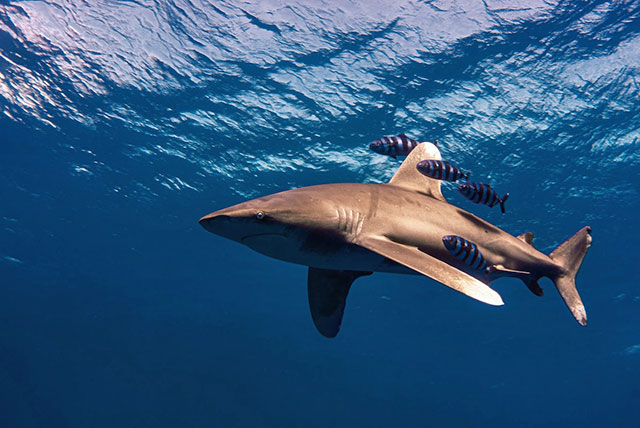
As it is the shoulder season from April until June, there are fewer divers in the water, cheaper prices, and yet still plenty of topside activities. Yes, it can be rainy at this time of year, but it is still mostly sunny and the waters are warm.
The Bahamas’ covid-related entry requirements:
- Proof of vaccination.
- Negative pre-departure covid test (PCR or RAT 3 days before arrival).
- Apply for a Bahamas Travel Health Visa.
- Purchase Bahamas Travel Health Visa Insurance.
- Visit the Bahamas Travel Health website for more information.
Cayman Islands
Why visit the Caymans Islands now?
Although the Caymans are heading into the rainy off-peak season, there is still great diving on offer. The rain has little impact on the phenomenal visibility the islands are famous for and there are hundreds of dive sites to explore – with over half of them wall dives.
Grand Cayman has exceptional wall diving on every side of the island, with eye-catching archways, drop-offs and plenty of passing pelagics. It also hosts one of the most famous wrecks in the Caribbean, the USS Kittiwake, and dozens of friendly stingrays at Stingray City.

Hop over to Cayman Brac to dive the Keith Tibbetts wreck, an enormous 100-meter-long (330 feet) Russian frigate, then visit Little Cayman to experience some of the most dramatic wall diving in the world.
There are dozens of dive sites at Little Cayman, with walls plunging to over 1828 meters (6000 feet) plus shallow walls and reefs for Open Water divers to enjoy. The most famous, Bloody Bay Wall, is a submerged mountain range that drops dramatically to the seafloor.
The Cayman Islands’ covid-related entry requirements:
- Proof of vaccination.
- Apply for a Travel Cayman certificate.
- Negative pre-departure covid test (PCR or LFT 24 hours before departure).
- Medical & travel insurance that covers covid.
- Visit the Cayman Islands Government website for more information.
Belize
Why visit Belize now?
Now is the peak season for diving and tourism in Belize, offering crystal-clear waters and the chance to swim with whale sharks. It is a great place to combine diving with a family vacation, as there is simply so much to see topside and underwater.
Home to the second largest barrier reef in the world and more than 400 islands, Belize hosts a unique range of dive sites and diverse marine life. The reefs are bustling with colourful fish and critters, there are plenty of pelagics in the blue, plus charming sea turtles and sharks.
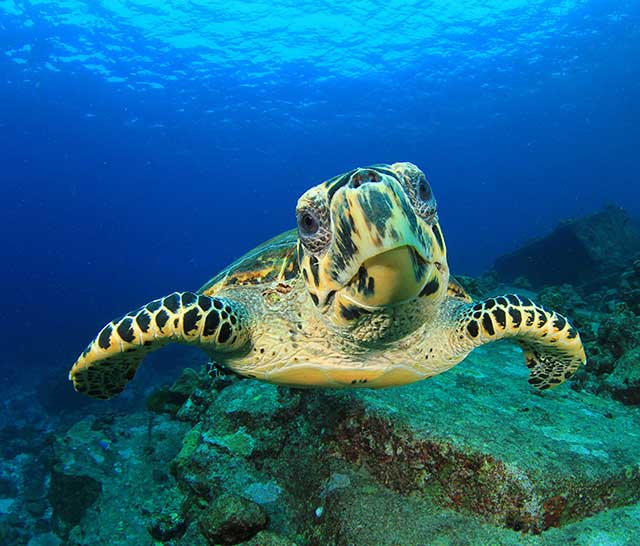
The Hol Chan Marine Reserve has some of the best Belize scuba diving and snorkelling for all experience levels, with beautiful coral reefs and the chance to snorkel with laid-back nurse sharks and stingrays.
Turneffe Atoll has equally great reef diving, plus big walls and drift dives for more advanced divers. Lighthouse Reef is a must if you want to dive Belize’s famous Blue Hole and Gladden Spit hosts whale sharks at this time of year.
Belize’s covid-related entry requirements:
- Proof of vaccination.
- Negative pre-departure COVID test (PCR 72 hours /RAT 48 hours after arrival) required for some travellers.
- Visit the Travel Belize website for more information.
What to check before you go
Whilst we have summarized the current covid-related entry requirements for the countries in this article, the covid situation is still evolving.
Check the latest travel guidance when planning your trip and use this handy summary to prepare:
- What type of vaccination proof do you need to provide?
- Are there any vaccination exemptions, such as for children?
- Can unvaccinated travelers enter the country?
- What Covid-19 tests do you need to take and when?
- Do you need covid-related health and travel insurance?
- Is there additional health screening you need to complete?
- Do you need to apply for a health travel authorization or similar?
- Do you have to stay in a government-approved hotel? If so, how long for?
- What public health measures do you need to take during your stay?
Kathryn Curzon, a shark conservationist and dive travel writer for SSI (Scuba Schools International), wrote this article.















